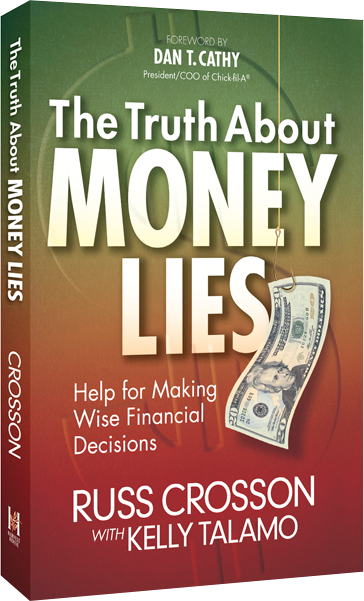The World’s Lens
The world doesn’t help us, either. Commercials bombard us with the idea that we “deserve it.” And they make everything seem easy to obtain. I recently received a flyer promoting gas grills for warm-weather cookouts. I observed that the flyer never listed the grills’ prices. I saw $15.11/month, $24.78/month, $28.17/month, and so on … but no total price. And on top of that, it never mentioned the interest rates!
At the height of the real estate market boom, I received an imitation check in the mail from a bank. It said that, due to rising home values in my area, I qualified to “get ahead” by combining my mortgage and other debts — plus, I could get an additional $44,000 in cash.
These ads are illustrations of how the world tries to make us feel dumb by not living its way. Words such as “smart,” “savings,” and “getting ahead” are designed to fool us into believing lies about money.
The Consequences
Unfortunately, we use the ease of credit cards and payment plans to immediately have things without currently paying for them. Think about that. We live in a time when things aren’t really paid for. We can buy almost anything with a payment plan: refrigerators, microwaves, cell phones, and so on. We let the world fool us into forgetting that debt is debt, and it must be paid back.
Consider this: if I owe $2,000 on a credit card and make only the minimum monthly payments, it will take 32 years to pay it back! That’s right — 32 years to pay it back by making minimum payments. Why? Because most of the payments are going toward interest. Although the cost varies with each credit card company, remember that these creditors allow us to make minimum payments for a reason: it maximizes their profits.
Delayed Gratification
Borrowing today sentences us to a restricted lifestyle in the future. The wiser choice is to live within our means. Instead of gratifying a desire by buying something now, we need to be willing to wait. We need to know what our priorities are.
Looking back, there were times when my wife and I could have even paid cash for an item, but we had higher goals (such as building an emergency fund and saving for our kids’ education). By employing the principle of delayed gratification, our financial lives stayed in better balance, and we had peace of mind.
Is Debt Always Bad?
At this point, you may be wondering if debt is ever okay. All debt can create bondage and should be feared. But consumer debt should be your worst fear. Generally, debt may make sense for items that could increase in value (like businesses and real estate).
However, our economy has experienced financial meltdowns that teach us that even “safe investments” aren’t immune from the dangers of debt. Millions have seen the value of their homes quickly (and without warning) fall below the balance due on their mortgages. This means that you should exercise caution, even with “good investments.” Be sure that if you have debt tied to a business or real estate, you can afford it if it fails.
It is possible to live without dangerous debt (and that includes car loans). It requires discipline, but it is possible. If you can’t pay cash for a consumer item, don’t buy it. Wait. Save. Pay cash. Making payments is not the same as being able to afford the things you want. ![]()









